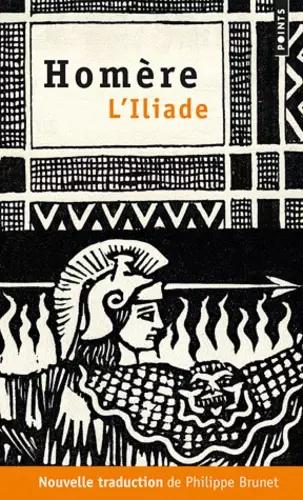Raccoon Reader reviewed The Iliad by Homer
Review of 'The Iliad' on 'Goodreads'
4 stars
Demasiados adjetivos (en serio, incluso más que Lovecraft) y arcaísmos por doquier. A parte de eso, LA WEÁ ÉPICA. Cualquier chocolate oe zi.

French language
Published Jan. 19, 2012 by Éditions Points.
The Iliad (; Ancient Greek: Ἰλιάς, romanized: Iliás, Attic Greek: [iː.li.ás]; "a poem about Ilium") is one of two major ancient Greek epic poems attributed to Homer. It is one of the oldest extant works of literature still widely read by modern audiences. As with the Odyssey, the poem is divided into 24 books and contains 15,693 lines in its most widely accepted version, and was written in dactylic hexameter. Set towards the end of the Trojan War, a ten-year siege of the city of Troy by a coalition of Mycenaean Greek states, the poem depicts significant events in the siege's final weeks. In particular, it depicts a fierce quarrel between King Agamemnon and a celebrated warrior, Achilles. It is a central part of the Epic Cycle. The Iliad is often regarded as the first substantial piece of European literature. The Iliad, and the Odyssey, were likely written down in …
The Iliad (; Ancient Greek: Ἰλιάς, romanized: Iliás, Attic Greek: [iː.li.ás]; "a poem about Ilium") is one of two major ancient Greek epic poems attributed to Homer. It is one of the oldest extant works of literature still widely read by modern audiences. As with the Odyssey, the poem is divided into 24 books and contains 15,693 lines in its most widely accepted version, and was written in dactylic hexameter. Set towards the end of the Trojan War, a ten-year siege of the city of Troy by a coalition of Mycenaean Greek states, the poem depicts significant events in the siege's final weeks. In particular, it depicts a fierce quarrel between King Agamemnon and a celebrated warrior, Achilles. It is a central part of the Epic Cycle. The Iliad is often regarded as the first substantial piece of European literature. The Iliad, and the Odyssey, were likely written down in Homeric Greek, a literary amalgam of Ionic Greek and other dialects, probably around the late 8th or early 7th century BC. Homer's authorship was infrequently questioned in antiquity, but contemporary scholarship predominantly assumes that the Iliad and the Odyssey were composed independently and that the stories formed as part of a long oral tradition. Given widespread illiteracy, audiences were more likely to have heard the poem than read it; it was performed by professional reciters of Homer known as rhapsodes. Critical themes in the poem include kleos (glory), pride, fate and wrath. The poem is frequently described as a masculine or heroic epic, especially compared with the Odyssey. It contains detailed descriptions of ancient war instruments and battle tactics, and fewer female characters. The Olympian gods also play a major role in the poem, aiding their favoured warriors on the battlefield and intervening in personal disputes. Their characterisation in the poem humanised them for Ancient Greek audiences, giving a concrete sense of their cultural and religious tradition. In terms of formal style, the poem's repetitions, use of similes and epithets, are often explored by scholars.
Demasiados adjetivos (en serio, incluso más que Lovecraft) y arcaísmos por doquier. A parte de eso, LA WEÁ ÉPICA. Cualquier chocolate oe zi.